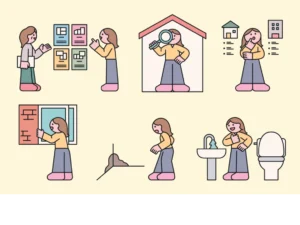LA County Supervisors Reject New Renter Protections With COVID Eviction Rules Set To Expire Next Week
 After about three years of shielding tenants from evictions due to non-payment of rent, L.A. County is set to scrap renter protections tied to the COVID-19 pandemic.
After about three years of shielding tenants from evictions due to non-payment of rent, L.A. County is set to scrap renter protections tied to the COVID-19 pandemic.
Housing advocates and renters had called for more help before March 31, when the COVID-19 protections are set to expire. But county leaders rejected a proposal on Tuesday intended to soften the blow for renters who could soon face eviction.
After hours of debate, the L.A. County Board of Supervisors voted against setting up new protections tied to the ongoing homelessness emergency they declared earlier this year.
The decision to end all emergency tenant protections marked a shift from previous votes, when county supervisors repeatedly extended policies aimed at helping renters stay housed.
“There has been time for our cities to put in place their own protections,” Supervisor Janice Hahn said during the meeting. “At this point, it feels like an overreach right now to impose these [rules] on the incorporated cities.”
The new protections that were voted down were proposed by Supervisors Lindsey Horvath and Hilda Solis, two progressive board members who previously tried and failed to extend the COVID-19 protections through June. Supervisors Hahn and Kathryn Barger voted against the new rules, while Supervisor Holly Mitchell abstained.
The proposed rules that didn’t muster enough support
The new protections shot down by the L.A. County Board of Supervisors would have:
- Required landlords to cite a specific reason for evicting renters (such rules, known as “just cause” protections, already exist for many renters, but in certain cases landlords can evict tenants for no stated reason)
- Allowed renters with roommates or pets who moved in during the pandemic without authorization under the terms of their lease to stay for another year before facing potential eviction
- Prevented landlords from raising rents by more than 3% per year for tenants living in rent-controlled apartments in unincorporated parts of L.A. County
During the meeting, Horvath spoke passionately about the need for more help for renters.
“Tenant protections are homelessness prevention,” Horvath said in support of the failed proposals. “We can make an immediate impact on this emergency by stopping the inflow into homelessness and protecting tenants from losing their homes.”
On any given night, more than 69,000 L.A. residents are experiencing homelessness, according to the region’s most recent count. Housing advocates have credited local eviction protections during the pandemic for slowing the increase in L.A. homelessness in recent years — and they’ve warned numbers could surge when the protections go away.
Barger expressed frustration over delays in the county’s $45 million relief program for small landlords struggling from missed rent payments. So far, none of that money has been delivered.
“There is a sense of urgency here,” Barger said. “We’re talking about people who may end up homeless. And we’ve got individuals that need to be made whole as well: mom and pops.”
Fears of a looming eviction boom
L.A. County’s COVID-19 emergency tenant regulations have given low-income tenants protections in eviction court if they can’t pay rent on time due to economic harms brought on by the pandemic. But those tenants will have to pay their April rent on time — or face eviction.
L.A. Mayor Karen Bass, who has focused on homelessness during her first 100 days in office, has said that she fears the expiring COVID-19 protections will lead to a spike in evictions and homelessness.
An estimated 246,000 households in the L.A. metro area are currently behind on rent, according to recent U.S. Census Bureau survey data.
Tenant advocates worry that even if renters can pay their rent next month, they could still face eviction for other reasons. In certain cases, many renters could be evicted for no stated reason at all, while others could face eviction over the presence of roommates or pets who moved in during the pandemic in violation of lease terms.
“Landlords are chomping at the bit to be able to have any reason to kick out a tenant, and particularly below-market, rent-controlled tenants,” said Dianne Prado, executive director of HEART LA, an organization that advocates for renters with pets.
Tenant advocates say the pandemic forced many renter households to rearrange their living situations. Some brought in new roommates to afford rent after a job loss, while others had to care for sick family members. Many adopted pets to cope with pandemic-induced isolation.
Even with COVID-related protections for unauthorized occupants still in place until the end of the month, some L.A. County renters have already been threatened with eviction over their pets. The new rules that failed to pass on Tuesday would have kept protections for unauthorized roommates and pets in place through March 31, 2024.
Landlords successfully urged an end to emergency protections
The board of supervisors also rejected a proposed expansion of “just cause” eviction protections, which would have required all landlords to state why they are pursuing an eviction.
The city of L.A. recently expanded “just cause” protections. And state law provides such limits on eviction for tenants living in apartments built more than 15 years ago. But many single-family home and condo rentals are exempt from the state law, and it does not cover tenants who’ve lived in their apartments for less than one year.
Landlords and property owner advocates urged the board of supervisors to reject new tenant protections.
In a letter to the board of supervisors ahead of Tuesday’s meeting, Fred Sutton with the California Apartment Association called the new batch of tenant protections “nothing more than a politically motivated abuse of emergency powers that does nothing to address the underlying issues of the homelessness crisis.”
Tenants who accrued rent debt during the pandemic will not have to repay past-due rent right away. L.A. County’s rules give tenants one year to repay back rent from previous months in the pandemic.
Source: laist.com













 Accessibility
Accessibility